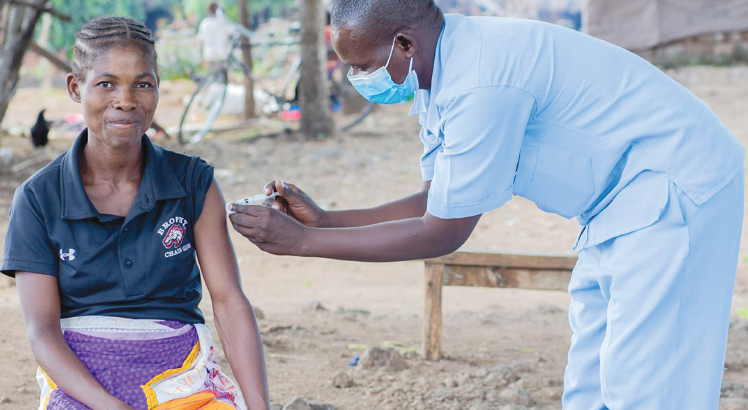Covid jab meets routine vaccines
On a sunny morning, two community health workers are hard at work under a leafy tree in the middle of Chambuluka Village in Chikwawa District.
Justin Jiyajiya, named the district’s best vaccinator, is providing Covid-19 vaccines to villagers and passers-by aged 12 and above while Paul Alfonso is giving children below five routine immunisation and treating common illnesses.
When Eunice Mponda, a 38-year-old mother of four, sees her neighbours getting the Covid-19 jab at the monthly “under-five clinic”, she paces towards the perspiring pair to get vaccinated too.

“Seeing people getting vaccinated close to home persuaded me to come and protect myself. I am afraid of endless Covid-19 waves which claimed the life of our ex-member of Parliament, one of the two Cabinet ministers who died in 2021. I don’t want my children to be orphaned,” she explains.
Mponda received the single-dose Johnson & Johnson, making her one of nearly 1.1 million fully vaccinated people in Malawi. Some 1 193 702 have received just a single dose of either AstraZeneca or Pfizer vaccines.
“I’m excited because I didn’t have to travel to Nkumaniza Health Centre, a six-kilometre trip that takes almost an hour on foot and costs K1 000 on a motorcycle. I thank the health workers for using the under-five clinic to bring the Covid-19 vaccine to our community,” she states.
Jiyajiya has delivered big on Covid-19 vaccination in Chikwawa. This month, the health surveillance assistant (HSA) at Nkumaniza Health Centre was named the best vaccinator in Chikwawa.
The recognition from the district health office follows his selfless walks to deliver vaccines to rural settings.
“This recognition has fired up my zeal to leave no one behind. I hope the integrated approach will help many get vaccinated because both Covid-19 vaccines and routine immunisation are important,” he says.
Jiyajiya has made Covid-19 vaccines part of essential supplies for his community outreach to Chambuluka and surrounding villages.
“Covid-19 vaccination is a health service like any other,” he says. “The integrated approach is helping people stop doubting the hugely misunderstood vaccines,” he reasons.
The new strategy got underway in January 2022 amid pockets of resistance.
“When I first raised the idea, community leaders were wary. They felt some people would stop bringing children for routine immunisation, but the numbers haven’t fallen. The only difference is that many people are utilising the chance of getting vaccinated close to home,” he narrates.
During the visit, Jiyajiya vaccinated about 25 locals against the resurgent pandemic, lessening their chances of being hospitalised or dying if exposed to the virus.
“Administering Covid-19 vaccines together with other health services clears the impression that people can do without it. This is our greatest weapon in the war against the pandemic,” Alfonso chips in.
For him, putting all recommended vaccines side by side helps lessen the workload of overstretched health workers. They face piling pressure to sustain routine immunisation for every child alongside emerging public health emergencies such as Covid-19, wild poliovirus and cholera outbreaks.
Their workload has kept surging since March 2021 when President Lazarus Chakwera publicly took his first jab to assure the southeastern African nation that vaccines are safe.
“For a year, the focus has shifted towards Covid-19 vaccines, but routine immunisation is not less important. Both deserve equal attention and effort. Integrating them is efficient for us because it reduces the number of long trips we make to deliver these vital vaccines to rural communities,” says Alfonso.
The community health workers also provide modern family planning, infection prevention messages and other primary health care services.
The pandemic, coupled with the recently confirmed polio case in Lilongwe, the capital city of Malawi, has made their work harder.
“The emerging emergencies call for efficient and innovative ways to deliver different vaccines without making one appear less important to the people we serve,” says Alfonso.
GVH Chambuluka commends the health workers for stepping up Covid-19 vaccination rates in the area.
The local chief says: “I wasn’t exactly keen on the new idea because myths and misconceptions about Covid-19 vaccines were rampant.
“Some Malawians believed social media lies that those who were receiving Covid-19 would die or become barren. As a leader, I didn’t want anyone to think the health workers were giving children the hugely misconstrued vaccines.
Far from these fears, GVH Chambuluka says: “The numbers getting Covid-19 vaccination show that many people are happy to get the vaccines closer to where they live or work instead of walking to the nearest health centre for the jab.”





